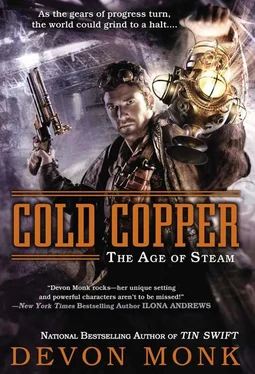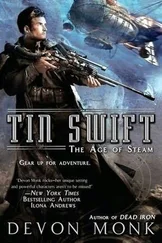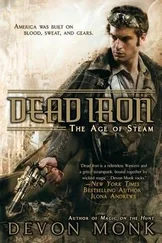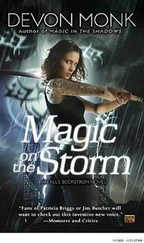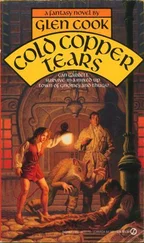“We’ll have them out before the trial ends,” Cedar said.
“I agree,” Miss Dupuis said.
“How?”
Cedar just shook his head, and Mae’s eyes widened a bit. She understood. If they had to, they’d break the Madders out.
“What about the missing children?” she asked quietly, even though the driver and footman wouldn’t be able to hear her over the noise of the coach.
Cedar frowned and stared out the window. “I’ll do what I can to find them while the Madders are in jail. But in this weather…”
He didn’t have to finish. They’d all known it was a lost promise. Children gone wandering in snow, in blizzards, were rarely found alive. And if they hadn’t gone wandering, if instead they’d been stolen away by boat or airship or rail, there would be no trace of them now.
“I will look for the children,” Mae said.
That brought Cedar straight out of his wandering thoughts. “Mae.”
“You need to find the Holder, and you must. Do you think it is anywhere near here?”
Cedar nodded. “Close enough I’ve caught wind of it. But not enough that I know which direction to turn.”
“Then it’s settled,” she said. “You will find it. And if it is near—”
“And if it is not?” he asked.
“We were following its trail before the blizzard hit. It must be near. I do understand,” she added quickly, “that Miss Dupuis will be busy preparing her argument to save the Madders. I’m not going to just stand on the porch worrying while she defends the Madders and you hunt for the Holder. So I will look for the children. I may even have some spells that could help locate them.”
Cedar pressed his lips together to keep his objections behind his teeth. He didn’t like the idea of her searching alone. “You’ll take Wil with you.”
She shook her head. “Wil should go with you. To find the Holder. Especially since you’ll be…” She didn’t say it, didn’t have to. They all knew the full moon was coming tonight. Then he’d be a wolf with barely a man’s mind. Lost in a killing lust for the Strange, and caring nothing for hunting the Holder.
“I won’t leave you alone,” Cedar said.
Mae gave him the sort of smile that reminded him she’d traveled a good lot of this country at great risk to herself when she’d left the coven to start a new married life years ago. And that had been when she was sworn and bound to not use her magic.
“I will be careful,” she said. “As I hope you will be.”
He nodded, having no words to give her. If he lost her, if her search for the children brought her harm, the vestiges of his humanity would fall from him like an unbuttoned shirt.
And then it wouldn’t be just the Strange that he killed.
The city was fully awake and even more crowded than when they had driven through on the way to the mayor’s. The clash of voices, ringing of bells, and the constant ruckus of wheels over snow, harnesses, and the rattle and chug of steamers stirred the pulse of the living city.
And beneath it all, Cedar could hear the Strange. Wailing, crying. Their voices snatched away by the wind as quickly as he heard them.
Why were they caught in sorrow? What could make an inhuman thing grieve? He searched the street, peered in windows of buildings, and stared at shadows. Although he heard the Strange, he didn’t see them.
Odd.
The carriage took a side street and detoured through a poorer part of town. Here the windows were covered with boards and newspapers, laundry hung in lines and over copper wires between buildings, even though the day was freezing.
People were just as busy here, but most wore much plainer clothes. It was here, more than in any other part of town, that the obvious lack of children on the street struck him.
Women with infants bundled close against their chests walked the slick streets with sacks of goods from the market. A lame boy, perhaps ten or twelve, leaned on a corner post, trying to keep the newspapers tucked beneath one arm dry from the snow. He saw no other children. The missing sight and sound of children among the noise of the place was like a piano lacking every other key.
It was this street that reminded him Des Moines was a hardworking shipping and coal-mining town that had built itself up on the shoulders of those who bent their backs to hard labor.
Mayor Vosbrough, Mr. Lowry, and Miss Daffin might be enjoying the luxuries of life, but the rest of the citizens were not as fortunate.
“What do you know about Des Moines, Miss Dupuis?” Cedar asked.
She shook her head. “Not much, I’m afraid. Several years ago we heard that one of the Vosbrough family had set himself in a powerful position and lobbied, bribed, and blackmailed to have the railroads meet here.”
“The rail doesn’t cross in Des Moines itself,” he said. “There are spurs, but the main line is north, isn’t it?”
“Yes. But this is the capital city of the state and, as Vosbrough is prone to remind us, seated between both major rivers, which run north and south.
“Between the rail and rivers, the town can be reached from all corners of the land, and with the airship fields, all corners of the sky.” She paused. “Des Moines is quite well-set between mountain ranges and all the goods they offer.”
“Access to glim harvested above the western mountains,” Cedar said. “And access to store it, use it, or sell it anywhere in the country they want.”
“Yes. That is one of our concerns,” Miss Dupuis said. “It is too much of a coincidence that one of the richest families in the country is so conveniently seated in the hub of all modes of transportation and shipping.”
“And communication,” Mae pointed out. “All these wires.”
Cedar ducked a little to better see the poles and lines stringing the city. She was right. Telegraph wires connected like a weave over the top of each roof, knotting together and marching across every rooftop, carried on the arms of overhead poles.
“Communication to whom?” Cedar asked.
“As Mr. Alun Madder said, the Vosbroughs are in contact with those in the government,” Miss Dupuis said. “Congressmen, speakers, officials. And with those others who are connected to the Vosbrough family and are building their fortune in line with them.”
“Like Mr. Lowry,” Mae said. “If Alun Madder is correct, the Vosbroughs traded weapons and supplies on both sides of the war. Isn’t that also what General Alabaster Saint was accused of?”
“We have long suspected Alabaster was on their payroll, before, during, and after the war,” Miss Dupuis said. “The Vosbroughs have paid and blackmailed commanders to lose battles, have opened glim trade with pirates and brigands to stockpile the rare substance and control the price on the market, and have bought land from impoverished farmers, securing river passages, minerals, and supply points.”
“Do you have proof of these things?” Cedar asked.
Miss Dupuis shook her head. “Not enough. Even the president himself, with all his men, hasn’t managed to force the Vosbroughs to take the stand. The Madders were right in wanting to avoid this town.”
Cedar had never heard of these charges against the Vosbrough family. Which meant they not only could sin, and did so, but they could also keep their sins hidden.
That made Mayor Vosbrough a very, very dangerous man. Cedar’s stomach knotted with an uncertain fear. There was something about that man that bothered him to his core.
A steamer wagon bumbled out in front of their carriage and slowed to a stop, the driver cussing up a storm at the boiler breaking down.
Miss Dupuis glanced at the broken vehicle. “This might take some time.”
From this vantage, Cedar noticed tall scaffolding piercing the steam and smoke of the city. Behind the buildings around them was a factory of some sort. Great billowing clouds of black smoke poured out from it, and a distinctive smell of scorched metal filled the air with the stink of hot blood.
Читать дальше
